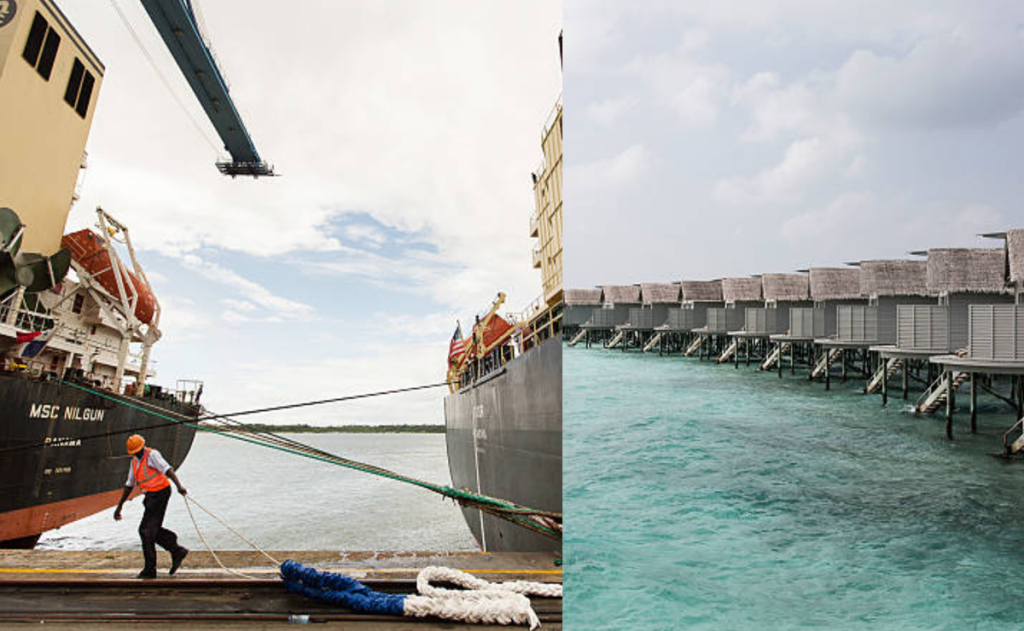
Maldivian and Kenyan officials meet in Malé to discuss a potential free trade agreement, aiming to boost tourism, fisheries, and agriculture.Trevor Snapp/Giulio Di Sturco/Getty Images
Focus on Economic Opportunities
Officials emphasized that the agreement could open up significant opportunities in tourism, fisheries, agriculture, and renewable energy, sectors both countries consider central to their growth strategies.
Kenyan representatives have highlighted the potential for their agricultural exports, particularly tea, coffee, and horticultural produce, to gain wider access to Maldivian markets.
The Maldives, on its part, views the deal as a chance to expand exports in fish products and enhance collaboration in the tourism sector, where Kenyan firms are eyeing investment opportunities in resort management and travel services.
Observers noted that both governments are aligning on the need to create incentives for businesses to establish stronger bilateral trade links, with an emphasis on diversifying economic relations beyond traditional partners.
Strategic Cooperation in the Indian Ocean
The talks also underscore the broader strategic importance of strengthening partnerships within the Indian Ocean region, where maritime security, logistics, and connectivity play key roles in regional trade integration.
Kenya’s delegation stressed that closer trade ties with the Maldives would support its strategy of expanding economic partnerships across Asia and the Indian Ocean basin.
Maldivian officials pointed out that the cooperation could complement their ongoing efforts to strengthen supply chains and reduce reliance on limited import sources.
The discussions are taking place in the context of shifting global trade dynamics, where smaller economies are seeking to secure resilient trade partnerships amid external uncertainties.
Investment and Business Partnerships
Beyond tariff reductions, the summit has highlighted the importance of encouraging private investment and joint ventures between Maldivian and Kenyan enterprises.
Kenya has invited Maldivian investors to explore opportunities in real estate, infrastructure, and the financial services sector, areas where Nairobi is positioning itself as a regional hub.
The Maldives, known for its high-end tourism economy, is seeking Kenyan expertise in eco-tourism and sustainable agriculture to complement its domestic development agenda.
Business leaders at the forum welcomed the talks as a step toward creating an enabling environment for cross-border entrepreneurship, which they argue is essential for translating political agreements into tangible growth.
Progress and Challenges in Negotiations Between Maldives and Kenya
Negotiators have agreed on the need for mechanisms to prevent trade imbalances and to ensure that both countries benefit equitably from the deal.
Customs harmonization, mutual recognition of standards, and the elimination of bureaucratic delays remain central to the discussions.
However, analysts caution that addressing structural differences between the two economies will require sustained dialogue, particularly in sensitive sectors such as fisheries and agricultural imports.
Officials confirmed that working groups have been tasked with drafting a framework that reflects the priorities discussed at the summit, with the aim of moving toward a formal agreement.
Regional and Global Context
The initiative has drawn interest from regional observers, who see it as part of a wider trend of countries strengthening South-South trade relations to reduce dependence on traditional markets in Europe and North America.
Experts also highlight the role of such bilateral deals in supporting the Istanbul Programme of Action for least developed countries, which calls for greater international trade integration.
At the same time, the negotiations align with Kenya’s vision to deepen links with island states in the Indian Ocean, a strategy that has already been seen in its outreach to other regional partners.
For the Maldives, the pursuit of expanded trade ties comes as part of efforts to diversify its economic partners and build resilience in the face of external economic shocks.
Next Steps Toward Agreement
Delegates agreed to continue technical consultations beyond the summit to finalize draft proposals and identify priority areas for early implementation.
Maldivian officials said they expect follow-up meetings within the year to assess progress and formalize commitments, setting a timeline for moving toward a comprehensive framework.
Kenya’s trade ministry confirmed that the summit outcomes would be presented to its cabinet for further consideration before advancing to formal negotiations.
Analysts suggest that the timeline for a final agreement will depend on the speed of technical assessments, political will, and private sector engagement on both sides.
For now, the summit marks a significant milestone in advancing discussions between the two countries, laying the groundwork for a potential free trade agreement that could reshape bilateral economic relations.
Outlook and Regional Significance
Both governments expressed optimism about the direction of the talks, noting that the summit has established momentum for future collaboration.
The outcome will not only influence bilateral ties but may also serve as a model for similar agreements between small economies seeking to strengthen South-South partnerships.
Observers believe that if finalized, the agreement could bolster trade resilience, open new markets, and contribute to broader economic integration across the Indian Ocean region.
As the summit concludes, all eyes remain on how swiftly both governments can turn commitments into a formalized pact that benefits businesses and citizens alike.
The discussions between the Maldives and Kenya highlight the growing importance of pragmatic, mutually beneficial trade cooperation in shaping the future of small and mid-sized economies worldwide.
The free trade talks, now underway, represent not just a bilateral negotiation but a broader effort to chart a path toward sustainable and diversified economic partnerships.
The success of this initiative will be measured by its ability to create tangible benefits for businesses, workers, and communities in both nations.
With negotiations progressing, the Maldives and Kenya remain positioned to redefine the scope of their economic cooperation for the decade ahead.
The summit has already underscored one key reality: small states can play a leading role in shaping new patterns of trade and investment when guided by shared interests and strategic foresight.
Both sides have signaled readiness to build on this momentum, leaving the region and international observers watching closely for the next stage of progress.
The final text of any agreement is expected to capture this shared ambition, while balancing the economic realities of two nations seeking greater opportunities in an evolving global order.
For now, the Malé summit will be remembered as the forum where the Maldives and Kenya laid the foundations of what could become one of the most consequential bilateral trade initiatives in the region.
Trade observers agree that the results of these talks may influence future partnerships across the Indian Ocean, setting a precedent for cooperation that prioritizes mutual growth.
The momentum built in Malé has thus placed both countries on a shared path toward a potentially historic agreement.
As negotiators continue their work, the free trade talks are already shaping perceptions of how smaller nations can lead in economic diplomacy.
The outcome of these negotiations will provide a crucial benchmark for South-South trade and its role in redefining global economic balances.
The Malé summit has opened a new chapter for the Maldives and Kenya, one that could see both nations leverage their strengths for a shared and sustainable future.
For both governments, the challenge now lies in converting discussions into a legally binding framework that secures long-term benefits for their citizens.
Also Read: Senegal Bargny Police Intercept 108 Migrants Attempting Hazardous Sea Voyage to Spain
Until that moment arrives, the ongoing negotiations stand as a significant reminder of the possibilities that emerge when countries commit to forging practical and balanced economic partnerships.
The summit thus closes with cautious optimism and a clear recognition of the transformative potential that lies ahead.

